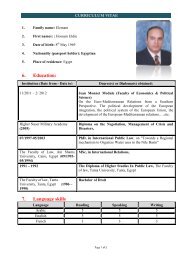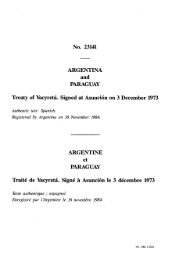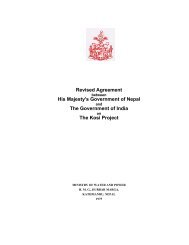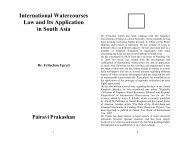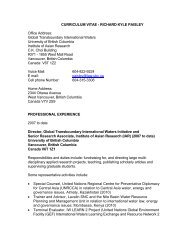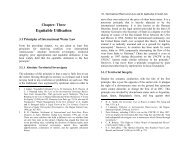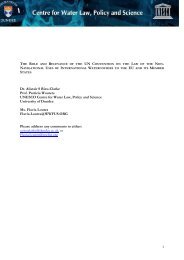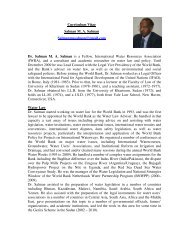Upreti, Trilochan, International Watercourses Law and Its Application ...
Upreti, Trilochan, International Watercourses Law and Its Application ...
Upreti, Trilochan, International Watercourses Law and Its Application ...
Create successful ePaper yourself
Turn your PDF publications into a flip-book with our unique Google optimized e-Paper software.
Equitable Utilisation / 133 134 / <strong>International</strong> <strong>Watercourses</strong> <strong>Law</strong> <strong>and</strong> <strong>Its</strong> <strong>Application</strong> in South AsiaThe other aspect of equity as envisaged in the Charter ofEconomic Rights <strong>and</strong> Duties of States <strong>and</strong> NIEO 89 providedthat the rich nations were obliged to give full economic <strong>and</strong>technological support to enhance the lives of the people ofdeveloping countries. The crusade of the newly independentstates of the third world, undertaken as a movement indem<strong>and</strong>ed from the North sufficient technological as well asfinancial help to obviate the grip of poverty. However, theNorth stating that there is no such law in this area compelling itto help the South always challenged this notion. 90 The authordoes support the notion that the North should cooperate withthe South in order to alleviate the poverty of the latter.However, it should be on moral grounds rather than legal duty.Whatever contribution the nations of the North are makingthrough their Overseas Development Aid is based on moralgrounds <strong>and</strong> at their sheer discretion. The reasons given forsuch co-operation from the South is that the presentinternational monetary as well as trading system is unfair <strong>and</strong>inequitable to the developing nations in which the developednations are benefited at the price of the former. 91 It wasrevealed in the 1997 UN review meeting at Rio de Janeiro that89 Supra note 26, pp. 112-130: The group of 77 has called two specialsessions of UNGA to discuss <strong>and</strong> adopt the resolution for achievinggreater justice <strong>and</strong> economic parity to them by eliminating unfair trade,<strong>and</strong> the monetary policy developed by the North. Two resolutions werealso adopted, but heavily criticised by the developed nations, such asAustralia, France, Italy Japan, UK <strong>and</strong> USA stating that a 'tyrannicalmajority' <strong>and</strong> 'growing tendency … to adopt one sided, unrealisticresolutions' that cannot be implemented at all, further, they were alsoblamed that these one sided resolutions destroy the authority of UnitedNations. Moreover, the comment of Julius Nyerere to the reaction ofthe North was: "I am saying that is not right that the vast majority ofthe world people should be forced into the position of beggars, withoutdignity. We dem<strong>and</strong> change, <strong>and</strong> the only question is whether it comesby dialogue or confrontation".90 M. Jacobs, The Politics of the Real World, London: Earthscan Pub.,1996, p. 63.91 Supra note, 26, p. 108.the developed nations did not fulfil what they had promised atUNCED, i.e., to contribute 0.7% of their income to the South. 92The other fundamental aspect of intergenerational equity(entitlement of future generations) is that it imposes a duty tofulfil the needs of developing countries in order to get rid ofpoverty <strong>and</strong> to do this in a sustainable <strong>and</strong> ecologically soundmanner so that the rights of present or future generation areprotected. There is not a clear definition on intergenerationalequity but it generally refers to the notion that the internationalcommunity is under a moral, even possibly a legal, obligationto protect <strong>and</strong> preserve the environment <strong>and</strong> its naturalresources for present <strong>and</strong> future generations. Being a part ofequity this topic has an inherent links with this research. Theidea is that the present generation in seeking its own prosperitythrough exploitation of watercourses, must not jeopardise theright of future generations to a clean environment.3.6.1 Unjust EnrichmentUnjust enrichment is when someone obtains property or getsrich without sufficient reason. From the preliminary meaning ofit, it points to unreasonable, illegal <strong>and</strong> unjust ways of gettingricher. Unjust enrichment indicates the proposition that a partyshould not enrich itself, without legal cause, at the expense ofothers. 93 Whilst equity st<strong>and</strong>s for greater justice <strong>and</strong> fairness,unjust enrichment underscores exactly the reverse position <strong>and</strong>therefore the concepts are closely linked.92 G. Brown, "An Assault on Poverty is Vital too", The Guardian 13February 2003, p. 23.93 Supra note, 69, p. 565. Also see R. Boyes, "Poles enraged by memorialto expelled Germans" The Times, 24 September, 2003, p. 14: Pol<strong>and</strong>fears a flood of compensation dem<strong>and</strong>s from Germans, whose propertywas taken after the Second World War when it joins the EU next year.The row centres on proposals to commemorate the 12 million peopledisplaced when Europe's border were redrawn.



